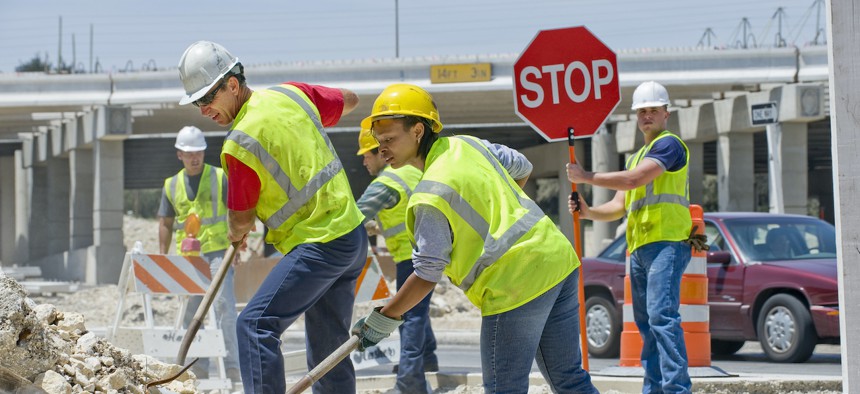The Connection Between Wage Theft and Climate Disasters

Yellow Dog Productions via Getty Images
COMMENTARY | For too many low-wage workers, workers of color and immigrants, wage theft is a painful part of life. Elected officials need to act to stop this practice, which is especially rampant after hurricanes, wildfires and other weather events.
If you are a salaried employee who went to work today, you likely didn’t question whether you would be paid. You assumed, like many people, that you would be compensated for your labor. Some construction workers don’t have this security and are accustomed to not earning their day’s pay despite the difficult, labor-intensive nature of their jobs.
Unfortunately, for far too many low-wage workers, workers of color and immigrant workers, wage theft is not a wild idea, but a painful part of life. It is also a problem that is exacerbated following natural disasters and weather emergencies. In fact, there is an unmistakable connection between wage theft and the disaster economy.
In the aftermath of disasters, companies hire construction workers to rebuild. These workers are tasked with demolishing walls inside damaged buildings and cleaning up disaster zones and destroyed neighborhoods. Afterwards, during the rebuilding phase, construction workers repair damaged homes and buildings from the plumbing to foundation or construct new homes in areas where the only option is to demolish and rebuild from the ground up.
Despite their critical efforts, day laborers, some who take on construction-related jobs, are regularly exploited, denied pay and subjected to unsafe work environments. The companies who hire these workers profit from disasters, even as many fail to pay workers, fail to pay on time and fail to ensure a safe work environment.
Problem of Epic Proportions
It may not consistently make headlines, but wage theft is a problem of epic proportion. Employers do this by siphoning off a portion of workers’ pay, passing bad checks, demanding overtime but failing to pay for it, misclassifying workers as independent contractors, etc. According to the Economic Policy Institute, minimum wage violations alone amount to a loss of $8 billion for workers each year.
In the aftermath of Hurricane Harvey in Houston, Workers Defense Project saw rampant violations of wage theft on reconstruction sites and stepped in to represent workers in recovering stolen wages. In a report commissioned by the Fe y Justicia Worker Center and the National Day Laborer Organizing Network, more than a quarter of workers doing recovery work in Houston had experienced wage theft after Hurricane Harvery hit.
Immigrant workers turn to worker centers like Workers Defense Project that offer legal representation because of how complicated navigating legal systems to recover wages can be. Many workers are also fearful of angering their employer and losing their jobs by speaking out–even more so for undocumented workers who are often retaliated against with threats of calling immigration and law enforcement.
Organizers with Workers Defense were on the ground after Hurricane Harvery educating workers about their rights, that Workers Defense was a resource they could turn to recover wages, and that they didn’t have to navigate state agencies on their own, like the Texas Workforce Commission.
In the nation’s 10 most populous states, 2.4 million workers lose $8 billion annually to minimum wage violations, a form of wage theft, according to EPI. Workers of color are more likely to experience minimum wage violations than white workers, the report says, Let that sink in for a moment–companies are stealing from predominantly poor Black and Brown communities already struggling to make ends meet.
The challenge is so severe that the U.S. House Education and Labor Committee recently advanced The Wage Theft Prevention and Wage Recovery Act to raise penalties on employers that violate wage requirements under the Fair Labor Standards Act. However, the bill has yet to make any movement in the House.
In lieu of reform from our federal and state government in Texas, Workers Defense created the Better Builder Program to go beyond minimum legal requirements on construction sites, which often go unenforced by underfunded agencies like OSHA. Through policy change and community education, the Better Builder Program seeks to improve conditions in the Texas construction industry by advocating for workplace standards like a living wage, OSHA safety training, workers’ compensation coverage, local hiring goals and independent third-party monitoring.
Certainly, everyone wants and needs their community to be rebuilt following a weather emergency. But most of us never consider that the people doing the rebuilding could face exploitation. Additionally, the same workers who are most likely to experience wage theft are also most likely to bear an outsized burden due to the climate crisis.
According to Mercy Corps, “People already burdened by poverty and oppression often suffer the harshest consequences, while having the least ability to cope. Their struggle to earn a living, feed their families and create stable homes is made more difficult every day the climate crisis continues.”The very people who face an outsized burden due to the climate crisis are more likely to have their wages stolen, while having fewer resources to navigate life in the aftermath of such injustice.
As we enter another wildfire and hurricane season, this issue warrants immediate attention. No one who works should wonder whether or not they’ll be paid.
The challenge for the rest of us is to push our elected officials to act, and to act fast. We know that construction workers in many places take on difficult work; let’s ensure they’re safe and compensated for their efforts. Construction workers are worth paychecks that equal the true value of their work. They are worth the safe and dignified working conditions that will ensure they make it home to their families.
Emily Timm is the co-founder and co-executive director of Workers Defense Project. She is a member of Organizing Resilience.
NEXT STORY: Philadelphia Mayor Sparks Outrage With Comments About a Shooting





